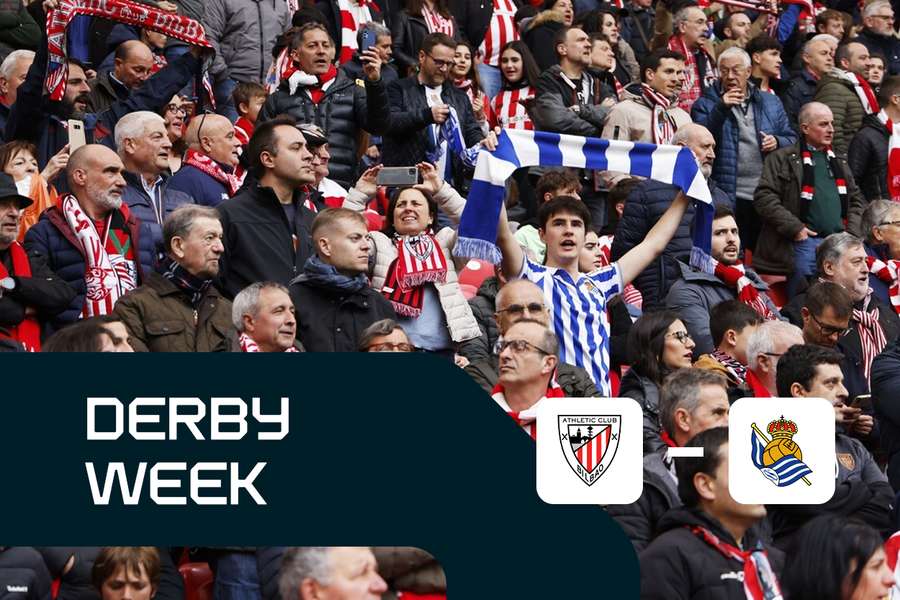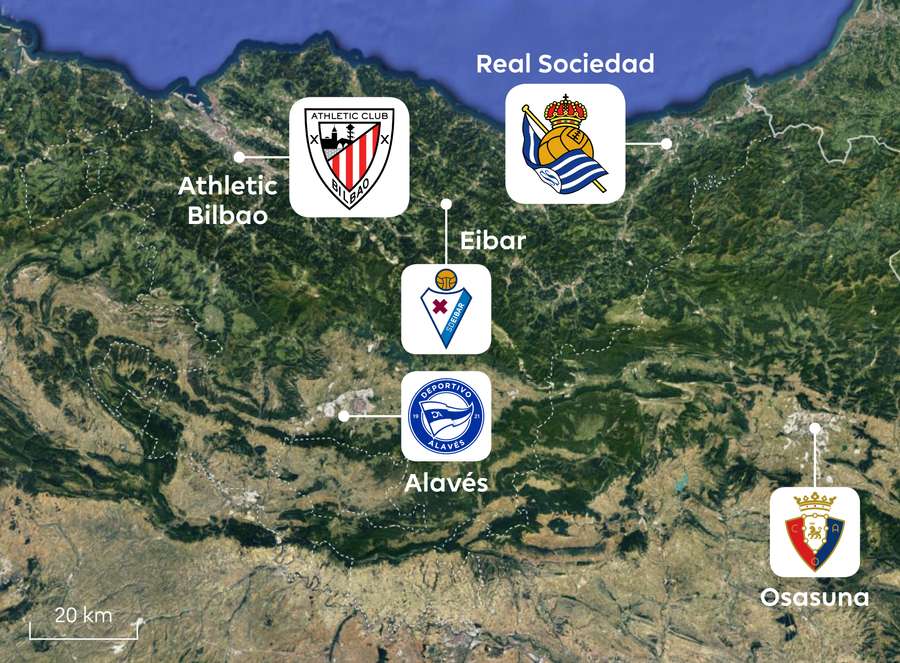Derby Week: The Basque Country takes centre stage for the derby that isn't a derby

It's a unique rivalry that reflects the uniqueness of the territory, which has an autonomous status within the Kingdom of Spain and whose inhabitants differ from the rest of their countrymen both in terms of genes and language.
The Basques are considered to be the last original inhabitants of the Iberian Peninsula, and perhaps of Europe as a whole. Although their region makes up only 1.4% of Spain's territory and approximately 4.5% of its population, it regularly supplies at least a fifth of LaLiga's cast. Indeed, in the 2018/19 season, all the local clubs finished between 8th and 12th in the table: Bilbao were eighth, Real Sociedad ninth, Alaves 11th and Eibar 12th.
If Osasuna, from the neighbouring region of Navarra, were added ('osasuna' means strength or health in Basque), the proportion of clubs in the top flight would jump to a quarter. Of these five, only Eibar, who have been regularly fighting for promotion from the second league to the first in recent years, are now missing from the top flight.

The friendliest of derbies
The biggest game in the region is a clash between two of the most successful clubs in the region, Athletic Bilbao and Real Sociedad. They are based in cities just 100 kilometres apart and are connected by the AP-8 motorway. That's why their duel is sometimes referred to as the AP-8 derby. More often, however, it is referred to simply as the Basque Derby.
However, this, like the entire region, is very unique. Don't expect any skirmishes, hatred, or insults. Fans of both teams participate together in events or debates in cafes and bars before their matches. Traditionally, there is also a mass march through the city, with supporters of both rivals commonly mingling in the stands.
The so-called Bertso Derbia, a competition between the two camps of fans in the traditional Basque art of bertsolaritza (improvised rhyming and singing), is a unique cultural feature of the game. The vast majority of football matches are thus completely incident-free. It is more about a healthy rivalry and mutual banter between the two cities, clubs and their supporters.
Despite the sporting rivalry, the two rivals can work together.
An example is their 1976 derby, which took place just after the fall of Franco's Spanish state. The Basque Country, but also other culturally distinct regions and their peoples such as Catalonia and Galicia, were under oppression under his regime.
Franco repressed the Basque, Catalan and Galician peoples' attempts at autonomy, banning the use of their languages and national symbols. He cracked down on his political opponents, most of whom ended up in prison, in camps or, at best, in exile. It was during the 1976 Basque derby that the captains of both teams brought the Basque flag together and placed it on the centre circle when they entered the field of play.
At that time, even though the dictator was dead, the flag of their region was still a forbidden symbol. This event brought the camps of both clubs even closer together, but above all, it was a message of encouragement to the entire Basque nation and was behind the fact that a year later the use of the Basque flag was legalised again.
A purely domestic journey
Many football clubs were founded in Spain in the late 19th century by Britons who came to the Iberian Peninsula to work. Among them was Athletic Bilbao (the name of the club itself shows the British influence). When the team won the Copa del Rey in 1902, the tournament's top scorers were two five-goal scorers from the winning team, English workers Walter Evans and William Dyer.
In the following editions of the Cup, British players also played a significant role, and not only in the Bilbao jersey. There were numerous protests from purely Spanish clubs that the use of foreigners should be banned. The Spanish Football Association did indeed take this step, and from 1912 it was the rule in the Copa del Rey that all players had to be Spanish citizens.
Athletic Club had to say goodbye to its British stars and established a tradition that only purely homegrown, Basque footballers could play for the club. Athletic's so-called cantera policy therefore drives a long-term focus on them developing their own players, who must come from the Basque Country. That includes the Navarra region and the Basque provinces in the south of France - thanks to this, French defender Bixente Lizarazu was able to wear the red and white shirt in the 1990s). It is incredibly unique in the world that Bilbao's management still adheres to this policy today.
Pundits may look at the team's roster this season and object to the inclusion of Ghana international Inaki Williams. However, he was born to Ghanaian parents in Bilbao and has been with the club since his teenage years (his brother and team-mate Nico represents Spain). Kenan Kodro is a similar case, having been part of Athletic's 2019-2021 squad. The Bosnia and Herzegovina international is a native of San Sebastian and a product of the academy of Real Sociedad there.
The latter instituted a similar policy, recruiting only Basques, but only in the 1960s. As Athletic Bilbao were historically more successful and wealthy and thus able to attract the best players from the region, it was very difficult for the other local clubs to follow the same philosophy in their recruitment. Eibar and Alaves didn't even try to, knowing they had no chance of fielding competitive teams. Real Sociedad did until 1989 when, to keep up with the level of the top Spanish competition, they brought in Irish striker John Aldridge from Liverpool.
Bilbao fans have been teasing supporters of other Basque teams, especially Real Sociedad, for their "inability" to play only their own footballers, and they are duly proud of their traditional, purely Basque club and the results they are achieving with a purely homegrown squad.
The Cantera, a hatchery of talent
The term cantera can be translated to hatchery. Despite the fact that Real Sociedad have since added reinforcements from abroad to their roster, the vast majority of the squad is still Basque and the club focuses heavily on nurturing young players in their academy. Probably their most famous product is Xabi Alonso, whose career took him from Real Sociedad to Liverpool, then to Real Madrid and then to Bayern Munich.
Other well-known players from the San Sebastian hatchery include Alvaro Odriozola (who moved to Real Madrid in 2018), while Frenchman Antoine Griezmann is also a product of the club. The Cantera has created one of the most expensive defenders ever in the French Basque Aymeric Laporte, who moved to Manchester City in 2018, as well as striker Fernando Llorente who left Bilbao for Juventus and the world's most expensive goalkeeper, Kepa Arrizabalaga, for whom Chelsea paid €80 million to Bilbao for in 2018.
Despite - or perhaps because of - the fact that both clubs have long adhered or still adhere to a Basque identity, they have been very successful, both on the domestic scene and in Europe. Athletic are an eight-time LaLiga champion, while Real Sociedad has won the title twice. While the last time both did so was in the 1980s, they are still in the very top tier of Spanish clubs, and have been for a long time.
The next Basque derby between the teams sitting fourth and sixth in the table will take place on Saturday, January 13 at 18:30 CET. You can follow the match on Flashscore.
Other derbies of the week:
Wednesday, January 10th
Italy - Coppa Italia
Derby della Capitale
The quarter-finals of the Italian Cup will feature the Rome Derby. The clash between Lazio and Roma is one of the most fiery duels in the world. The Lazio fans in particular are notorious - some extreme groups of the club's supporters use Nazi symbols on their banners and often racially abuse dark-skinned players in the rival team. The last meeting in November ended 0-0.
Greece - Kypello Elladas
Derby of the eternal enemies
Athens, the capital of Greece, is home to the so-called Big Three, the three most successful clubs in the country. They are Olympiakos (47 titles), Panathinaikos (20) and AEK (13, reigning champion). We have written about the Athenian clubs in Derby Week in the past. Now the eternal foes will clash in the Greek Cup.
Spain - Supercopa
El Derbi Madrileno
The battle for the Spanish Super Cup will take place in Riyadh, Saudi Arabia. The first semi-final of this mini-tournament is a match between the Madrid rivals. Their duel is not just a battle for footballing supremacy over the Spanish capital, but historically a clash of social classes and political opinions.
Saturday, January 13th
England - Premier League
West London Derby
Chelsea are historically the best club in West London. However, in the last Premier League season, they finished behind their local rivals, Fulham and Brentford. In the first derby of this season, Chelsea beat Fulham 2-0, but still remain far below expectations.
England - Championship
Coventry City - Leicester City
East Midlands Derby
Leicester were relegated from the Premier League last season, while Coventry narrowly missed out on promotion, losing on penalties to Luton in the play-off final. Therefore, both teams from the eastern Midlands will meet in the Championship.
Sunday, January 14th
Greece - Super League
Athenian Derby
Panathinaikos players will face their second local rival in four days after the cup derby with Olympiakos. The first match between AEK and Panathinaikos this season went the way of AEK (2-1); the next, like all other matches in Greece, will be played without spectators.
Tuesday, January 16th
Belgium - Beker van Belgie
The Battle of Flanders
Ghent and Bruges are beautiful historic cities in Flanders, and they are home to two successful clubs. Club Brugge are one of the best Belgian clubs of today - they have won the title three times in the last four years and have also done well in the Champions League. Gent too are one of the top sides in the domestic competition and also play regularly in Europe.
